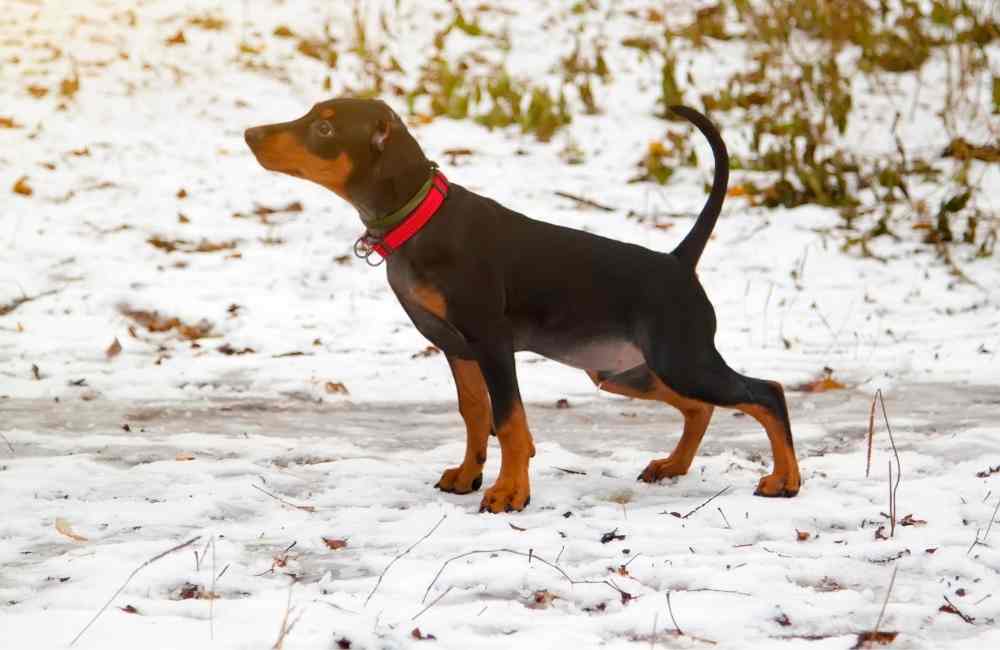Puppies are tons of fun. Their adorable play style, the way they love to cuddle and show us affection, and their silly actions make everyone wish they had their own adorable puppy to love. However, there are annoyances that come with puppy raising, too — no matter how cute they might be!
Chewing on our shoes or furniture (or feet), waking us up to play, and potty training are among these not-so-fun parts of puppy hood. One of the behaviors that are particularly baffling to puppy owners is when puppies pee while walking.
Why do they do this, and how can we stop it? No worries, I’ve got you covered. Read on for a list of reasons your puppy might be peeing while walking, and what you can do about it:
Submissive Urination
Submissive Urination is a common condition in puppies that are still finding their confidence. It can happen in a variety of situations, such as when a new person approaches them, when they hear a loud noise that startles them, or when they meet a new dog that intimidates them, to name a few.
Puppies are also not in full control of their bladders yet, which makes it even more likely that they’ll pee submissively. This can happen on walks, at parks, in the back yard, and of course inside the home, much to our disappointment!
While it’s very frustrating when this happens at home (let’s face it, none of us like cleaning up pee), it’s important to remember this is a fear/anxiety-based behavior. Punishing or making loud noises to stop puppers mid-stream will not be helpful here — in fact, it might even make the situation worse!
Excitement Urination
Excitement Urination seems very much like Submissive Urination on the surface, but the two are quite different. If you’re not seeing the typical anxious/fearful body language such as low tail, ears held back, yawning or lip licking, your pup probably has Excitement Urination.
Puppies typically do this because they’re overstimulated by something in their environment. This can mean anything from being happy to see you when you come home, playing too roughly with another dog or with you, or even when you come over to pick them up!
This can be an issue for older dogs, too, but it’s more common in puppies that haven’t yet learned how to control their bladders. Thankfully, most puppies outgrow this by the time they’re about a year old, though that doesn’t stop it from being frustrating at the time, does it?
Urinary Incontinence
Incontinence is more common in older dogs and large breed dogs, but it can happen to puppies, too. Unlike Excitement or Submission Urination, this is not a behavioral issue but a medical one. If you’re noticing things like wet spots where puppy sleeps, urine leakage (rather than actively peeing), or inflammation of the skin around their genitals, you may be dealing with Urinary Incontinence.
There are a variety of things that cause this condition. Recently being neutered or spayed, obesity, or a birth defect like underdeveloped bladder can all be to blame — among other medical conditions. Of course, checking with your vet will be the best first step. They can help you figure out the cause and advise you on treatment options for your pup.
While of course this can be a frustrating issue, it’s important to remember that your puppy isn’t doing it on purpose. It may seem like they’re trying to punish you — trust me, I know the feeling. However, punishing them in return will only make the situation worse, not to mention destroy the bond you’ve been building!
Urinary Tract Infections
Urinary Tract Infections (or UTI’s) are yet another reason your puppy might be peeing while walking. These can range from mildly annoying to downright dangerous, so it’s important to get puppers to the vet, and quick! If you’re seeing things like blood in their urine, whimpering when they pee, or if they’re only recently having trouble controlling their bladder, they might have a UTI.
UTIs are caused by bacteria, and usually respond to treatment quickly. However, UTIs can also be a symptom of a more serious condition, so it’s important to get your puppy to the vet as soon as possible so these can be ruled out.
While this can be frustrating as well as frightening, UTIs are usually just a temporary issue. Thankfully, once pup starts treatment his symptoms will resolve in a short period of time, and you’ll have your happy go lucky puppy back before you know it!
Marking
It’s common to assume that it’s just older dogs that use Urine Marking as a way to claim territory. However, puppies can begin this behavior at as young as three months old, and there are a number of reasons that they do it. If you’re seeing puppy lifting his leg to vertical surfaces, or if there’s another intact dog in the home, you may be experiencing Urine Marking.
Territory isn’t the only reason that puppies mark; it can be caused by anxiety, intimidation, or being socially over stimulated (when a male dog sees a female, for example). It’s important to remember that your pup is not trying to ruin your life, and that punishing her won’t change anything — no matter how maddening this might be!
While spaying or neutering can be helpful once they’re old enough, getting to the root of the behavior is equally important. They may be trying to tell you they’re anxious about something or someone, or they might just be confused due to changes in the home. Whatever the cause, it’s usually resolvable — so you can relax a little at least!
Ectopic Ureters
Ectopic Ureters is a less common cause of puppies peeing while walking, but it can happen. A medical condition caused by a birth defect, Ectopic Ureters basically means that the ureters — or the tubes that carry urine from the kidneys to the bladder — are in the wrong place, causing the urine to drain directly into the urethra.
This is a condition that’s more common in female puppies, though it can happen in males, too. Your vet will diagnose this for you, usually by way of a standard urinalysis and possibly an ultrasound. The good news is, it is treatable — the problem is usually fully resolved for most puppies, though it may mean having surgery or a laser procedure.
While this all sounds very scary as a doting puppy owner, don’t worry! Your vet will take good care of puppers and before you know it, they’ll be back to their old selves — only now you can actually potty train them!
Things You Can Do
Start With the Vet
In all cases of inappropriate urination, your first stop should always be the vet. No matter how maddening it is to deal with, it may very well be a medical issue, which can usually be treated. If it’s not a medical issue but a behavioral one, your vet will help to rule this out for you, as well as suggest courses of action to take.
While it might seem like a puppy who pees while walking is just stubborn when it comes to potty training, it’s not always the case. Visiting your vet and telling them all the behaviors and symptoms you’re seeing will help them to create a picture of why this might be happening, and what to do about it.
Potty Train Your Pup
Sadly, many puppies are punished for human error. It can be easy to assume that puppies know how to potty train themselves, or that they’ll figure it out as they get older — but they do need our help! Showing them where it’s ok to potty, taking them out often (especially when they’re very young) and praising them for going in the right places will make your puppy a potty-training pro in no time!
Consistency is everything in potty training — or any training, for that matter. We can’t expect a puppy to remember what to do if they haven’t learned it repeatedly, so do both of you a favor and stick with it! Another way to potty train successfully is to establish a routine; this way pups knows what to expect. Soon enough he’ll be telling you he wants to go out, and you can pat yourself on the back for a job well done!
Be Patient
If all medical issues are ruled out, potty training is complete, and you’re still seeing the walking while peeing behavior while you’re out and about, you may just need to be a little more patient. It’s a common trait in dogs and puppies to not want to miss out, and giving her the proper time to finish what she’s doing may be the one thing you haven’t tried.
Us humans are an impatient species, but dogs and puppies live in the moment; taking in all the sights, sounds and smells around them. If we’re pulling on them and telling them to hurry up all the time, it’s no wonder they pee while they’re walking! Give them a moment to let them enjoy their walks. We could even learn a thing or two about being more present by letting our puppies do this!
You May Also Be Interested In:
Should you rub a dog’s nose in its pee or poop?
How To Get Dog Pee Out Of Ugg Boots


